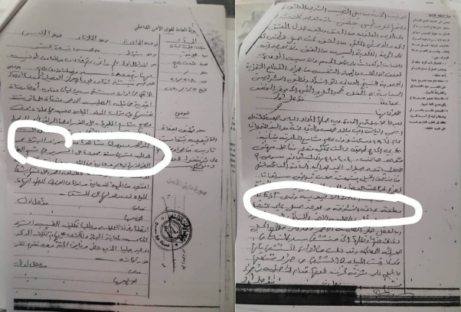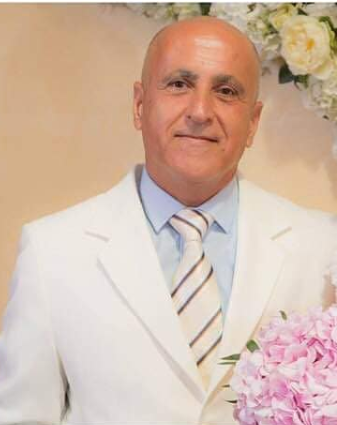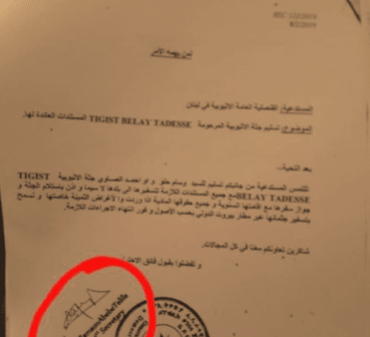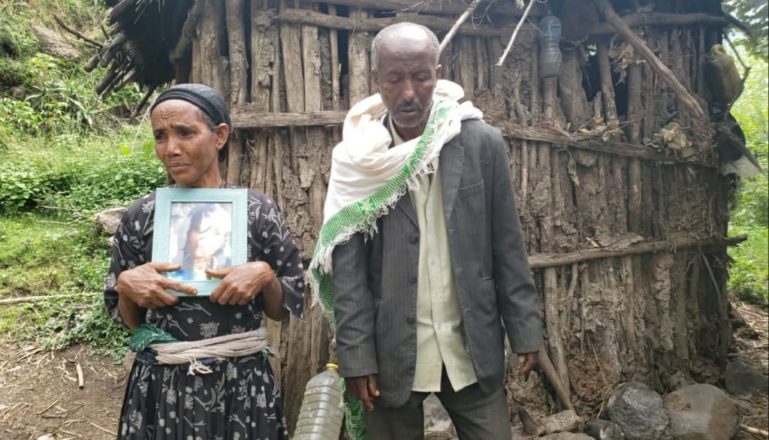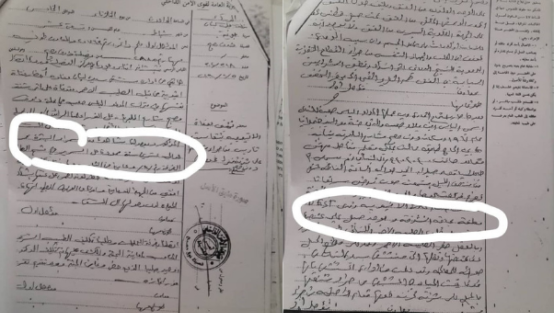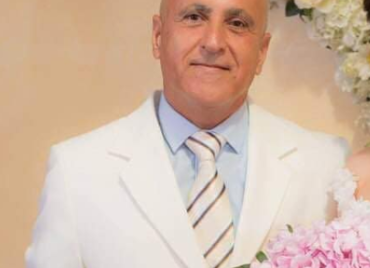THE VIDEO
Watch Dorcas explain her awful experience with the owner of “Magic Maids”
THE STORY
Dorcas Boadi, Ghanaian national, arrived in Lebanon on 30 May, 2019. On 19 January her mother passed away and she told her employer, DD, an employee of an international organization, that she wanted to go home for the funeral. At that stage, Dorcas had not been paid for 5 months. DD told Dorcas that she could only go home if she repaid the recruitment fees she’d paid the agent, Joseph Zakhia, Magic Maids in Zahle.
When Dorcas would not stop crying, DD took her to Joseph Zakhia who administered the treatment given by agencies to recalcitrant maids – a thorough beating. Dorcas wrote:
“The boy in the office (who she later identified as Joe) was talking to me to decide to work or I should pay back his money for him before I can go to Ghana. I was sitting down and looking at the man so quiet. In a little moment the boy stood up from his chair and came close to me. He started beating me all up because he was talking to me and I was quiet. He also said if I didn’t stay and she brought me to the office again he will put me in jail.”
Having been beaten into submission, Dorcas was returned to DD.
That’s when Dorcas wrote to This Is Lebanon who messaged DD on 21 January: “Dorcas has contacted us because a) she hasn’t been paid for 5 months and b) she wants to go home to attend her mother’s funeral. According to the Lebanese Ministry of Labor, you have broken the contract by not paying her for 3 consecutive months. She is actually entitled to be sent home with her full salary at your expense. She has agreed to forfeit her salary in order to get home quickly. Please send me a pic of her air ticket. Do NOT send her back to the agency. As you are aware, he has already beaten her up once.”
That same day, we received a message from Dorcas:
“She has booked my ticket and am at the airport now. I am very grateful.”
Joseph Zakhia is a repeat offender. We have had multiple complaints about his physical abuse of domestic workers. When will the Lebanese government provide some oversight and accountability so that Joseph and other agents like him do not have complete impunity to do with these women as they please?
The People
“He started beating me all up because he was talking to me and I was quiet. He also said if I didn’t stay and she brought me to the office again he will put me in jail.” – Dorcas
TAKE ACTION
We can’t do this alone. We need your help! Join us in this fight.
Contact the Abuser
Call Joseph and ask him to assist the other domestic workers trying to get home.
Share the Story
Tell others about this. Join us in the fight to ensure that Joseph is brought to justice.
Join Our Work
We need your help to continue our efforts in fighting for Dorcus and others like her.
Get the Updates
Get the updates straight into your inbox so you don’t miss any part of the story.
القصة
وصلت “دوركاس بوادي”، مواطنة من غانا، إلى لبنان في 30 أيار 2019. لكن والدتها توفيت في 19 كانون الثاني، فأخبرت صاحبة عملها “د د”، موظفة في منظمة دولية، أنها تريد العودة إلى بلادها لحضور الجنازة. و في تلك الأثناء، لم تكن دوركاس قد قبضت راتبها لمدة 5 أشهر. أجابتها “د د” بأنها لا يمكنها العودة إلى وطنها إلا إذا سددت رسوم التوظيف التي كانت قد دفعتها للوكيل جوزيف زاخيا، مكتب “ماجيك ميد”، في زحلة.
و إذ لم تتوقف دوركاس عن البكاء، أخذتها “د د” إلى جوزيف زاخيا الذي عالج الأمر بالطريقة التي تتبعها الوكالات مع الخادمات “المتمردات” – أي الضرب المبرّح. وكتبت دوركاس:
“كان الصبي في المكتب (الذي عرّفته فيما بعد باسم جو) يتحدث معي بشأن قرار مواصلة عملي أو سيكون عليّ تسديد أمواله قبل أن أتمكن من الذهاب إلى غانا. كنت جالسة أنظر إلى الرجل بهدوء. وبعد برهة قصيرة، نهض الصبي عن كرسيه واقترب مني. ثم بدأ يضربني بدون هوادة لأني بقيت صامتة بينما كان يتحدث إلي. و قال لي أيضاً أنه إن لم أستمر في عملي أو أحضرتني “د د” إلى المكتب مرة أخرى، سيضعني في السجن. بعد تعرضها للضرب لإجبارها على الخضوع، أُعيدت دوركاس إلى “د د”.
حينئذ كتبت دوركاس إلى “هذا لبنان” الذي بعث برسالة إلى “د د” في 21 كانون الثاني تقول: “اتصلت دوركاس بنا لأنها أولاً: لم تقبض راتبها منذ 5 أشهر، و ثانياً: تريد العودة إلى بلدها لحضور جنازة والدتها. و بحسب وزارة العمل اللبنانية، فقد انتهكتِ العقد بعدم دفع مستحقاتها لثلاثة أشهر متتالية. يحق لها بالفعل أن تُرسَل إلى ديارها على نفقتك الخاصة مع رواتبها كاملة. و لقد وافقت دوركاس على التنازل عن راتبها كي تعود إلى بلدها بأسرع وقت. من فضلكِ أرسلي لي صورة لتذكرة الطائرة الخاصة بها. لا تعيدها مجدداً إلى الوكالة. كما هو معلوم لديك، فقد سبق و ذاقت منه الضرب المبرّح أصلاً.”
في اليوم نفسه، تلقينا رسالة من دوركاس:
“لقد حجزَتْ لي التذكرة وأنا الآن في المطار. إني شديدة الامتنان لكم.”
إن جوزيف زاخيا لا يتوقف عن تكرار جرائمه. فلدينا العديد من الشكاوى بخصوص التعنيف الجسدي لعاملات المنازل. متى ستفرض الحكومة اللبنانية بعض الرقابة والمساءلة كي لا يتسنى لجوزيف و غيره من الوكلاء أن يفعلوا بهؤلاء النساء كما يحلو لهم؟
THE VIDEO
Watch GB explain her awful experience in Lebanon
THE STORY
GB, a 29-year-old married Ghanaian woman with three children, is an ambitious and hardworking woman. In Ghana, she worked on a rice farm and ran a small detergent business. Unfortunately, she suffered an unexpected huge loss when her purse was taken. Her mother’s friend, who had been to Lebanon, encouraged her to go there. She had no idea that she was going to be raped and abused and return with an empty suitcase.
On 10 April, 2020, GB contacted This Is Lebanon.
She was distressed, crying constantly, and desperate to go home.
Her employment agent, Hussein Mroueh, of Quick Step Services, had allegedly twice savagely beaten and tortured her, and she said that her current employer, Mohammad Hamdam, was sexually harassing her.
GB arrived in Lebanon on 18 May, 2019 and her first employers were Ahmad and Lama Zaitoun. She worked for them until 6 November of that year. Ahmad treated her well, but GB says that Lama was abusive.
GB says Lama was physically abusive, overworked her, didn’t provide sufficient food, and confiscated the clothes that she had brought from Ghana.
All of these are claims frequently attested by foreign domestic workers in Lebanon.
At some point during her work for the Zaitoun family, GB asked to return to the office where she says Mroueh beat her savagely and refused to allow her to change employers, sending her back to the Zaitouns. GB says that he didn’t give her a chance to explain her situation.
GB says Mroueh physically abused her: this included hitting her with a belt, and hitting her head against the wall. He took her phone, destroyed her sim card, and kept her phone. He allegedly locked her in a room, used starvation as a method to make her submissive, and told her he didn’t care if she died because he had insurance.
GB put This Is Lebanon in contact with Linda Boetema, a fellow domestic worker, who was employed as a domestic worker through the same agency and she also attested to being abused, and witnessing others being abused. It is common practice for employment agents in Lebanon to physically abuse workers.
On 31 November 2019, GB was sent to Mohammad Hamdan and Farida Qasem’s house in Beirut. She worked for them until 18 June, 2020 the day she left for Ghana.
“My boss, who is in his 60s, rubbed his hands on my body, breasts and buttocks, and tried to kiss me when I went to clean his office,” she alleges.
When she rejected him, he became very angry with her. Farida, 62, used to argue with GB because they had no common language. GB was terrified of being returned to the employment office; she suffered from general aches and fatigue and was desperate to go home.
On 20 April 2020, GB’s employers took her to Chebaa village, in the south east of Lebanon, where they own a house. Hamdan was still sexually harassing her, and she was not allowed to use her phone for much of the time (often until late at night) so frequently had no means to contact the outside world. “In the village anytime when the wife isn’t around, he tries to touch me, touch my buttocks, or come and sit on my lap, kiss, he’s been doing some funny funny things.” As for Farida Qasem, GB said that no matter how hard she worked she couldn’t please her. The madam noticed her husband’s attraction to GB and was growing irritable about it. The tension at home was growing daily. GB didn’t know where to go and she felt trapped with no escape possible.
G B forced to do hard manual labour.
G B beating for not finding Mohammad’s lighter
While at the farmhouse, GB had to clear the ground of rocks which caused cuts to her hands. She was overworked, underfed, stressed out, and in pain. She was given paracetamol for her aches. She was depressed because her employers kept verbally abusing her. GB wasn’t given access to the WiFi at the farmhouse, but occasionally managed to buy credit for her phone. This is key to her story, as it prevented her from collecting more evidence against her abusers. In a voice message she said:
“I hate everything here. When you are hungry you can’t eat. When you are tired you can’t rest. When you are sick, you can’t even go out and buy drugs for yourself. There is nothing that you do to please them, even when you do what you know is right, in their eyes it is wrong. They act as if they love you, but they hate you so much, especially the man. I am not safe. I want to go. I am tired. I am not safe. I want to go.” By the end of the message, she was crying.
On 3 May 3, 2020, GB narrated by voice message how Mohammad had assaulted her with a knife. Had the wife not been around to intervene, she believes that he would have killed her. Later the same day he gave her 6,000 LL (about $1) and told her that it was his house and he had the freedom to do whatever he wanted.
The following day, GB wrote to the Honorary Consul for Ghana, Michel Haddad: “I am a victim of sexual abuse, and I was about to be killed yesterday by my employer when he attacked me with a knife. I can’t go to the office because the agent Hussein Mroueh is a monster and already abused me physically before. I have the right to break the contract because my employers are abusing me. What is your plan for me? Where can I go?”
His initial reply was: “According to the law you are breaking the contract.” Later, he offered to report her case to Immigration. It’s unclear whether he ever reported it.
Later while they were on the farm, GB’s husband eventually learned that Hamdan had beaten her savagely because of a fight about his cigarette lighter, and almost killed her. He wrote to the Honorary Consul: “Dear Mr. Haddad, I am K*** A***, the husband of GB. She is a domestic worker in Lebanon. She already contacted you and asked for help. She told me today that she was savagely beaten by her employer, and he was about to kill her. A few weeks ago he attacked her with a knife. I don’t want my wife to die! On top of this he has been sexually harassing her. Can you do something to rescue her? What are my options? I don’t want my wife to return dead to her country. She is a wife and a mother of 3 young children. Is the Consulate of Ghana going to evacuate the Ghanaian citizens? When? Thank you in advance.”
On 17 May GB was still at the farmhouse and she shared the following incident with This Is Lebanon:
“He started beating me with his leg. I was standing leaning on a wall, but I bent my head down, he boot my stomach, he started slapping me. I could not shout or move. I screamed when he hit my mouth with a blow, and I started bleeding. Then his wife came in. I fainted and she sprinkled water on my face to wake me up and put medicine in my mouth, but I spit it out. When I woke up, my face washed with blood.”
GB’s husband was extremely worried and sent daily messages to This is Lebanon. Because GB was being paid, This Is Lebanon could not use the reason of non-payment of salary to contact the employers. If we called asking about the abuse, there was a risk GB’s employers would confiscate her phone and contact would be lost.
On 23 May, GB’s husband called her madam and found out that his wife’s phone was broken. Now the only channel to her was through her madam, which meant there was no way to record any evidence. Her employers were still at the farmhouse and wanted to spend the Eid holiday there.
Five days later GB’s husband sent a desperate voice message to us saying that Hamdan had raped her two days before. He reported the rape to the Honorary Consul who replied the following day asking for GB’s contact information which he had already been given.
Below is the WhatsApp conversation between GB’s husband and the Consul:
Husband: “What is your plan?”
Consul: “The airport is still closed. We are for their own departure to Accra when the Airport open.”
Husband: “Sir, my wife was raped. She can be raped again. Are you going to leave her to suffer longer there? Isn’t there a law, police, a safe shelter?”
Consul: “We know the case and the police also. So when the airport open will take care of her. Hope you understand the situation in the world.”
Husband: “Sir, I understand the airport is closed. Does this mean my wife must die like Faustina Tay without anybody intervening? Are you not able to call her employers and ask them to bring her in? A simple phone call from you could save her life. Please use your power as Honorary Consul to protect my wife from further harm. I await your response. Please treat this as a life and death situation requiring your urgent intervention. Thank you.”
Consul: “Hello according to my telephone call with her just now she confirmed that you spoke to her yesterday. The employer confirmed to me that he will put her on the first flight to Accra. Even that he pay to the agent Hussein Mroueh USD2500 that she will work for a period of two years even she did not finish her three months. We will keep in touch with her.”
This Is Lebanon considered this gross negligence but hoped that his call to the Hamdans would provide GB with a layer of protection. On 30 May the police went to the farmhouse. They talked to Hamdan who denied everything and said there had been a ‘misunderstanding’. The General Attorney accepted Hamdan’s solution: take her to the employment agency the following day. When the airport opened, the agency would send her to Ghana. GB’s husband requested a pregnancy test and a medical check up to see if his wife had caught any sexually transmitted disease. There was also a window of opportunity for a forensic doctor to get evidence of the rape.
On 3 June, GB’s husband contacted This Is Lebanon and said that his wife had been returned to her employer’s house and no medical test had been done. He wrote to the Consul: “Sir, you said that a medical check-up was done, but I have just talked to my wife and she said it was not done. Can you explain this please? I am confused. If a medical examination had been done earlier, it could have proved rape and it would have been enough to put Mr. Hamdan in jail for five years with hard labour. What is happening is not fair.”
The same day, we finally heard from GB. She confirmed that no medical test was done and that she was still in her employer’s house. She explained that on 26 May, after a struggle Hamdan raped her in the small bathroom, taking advantage of the absence of his family. Two days later, she managed to use a phone in the house to tell her husband. On 29 May, when the Consul called and she told him about the rape, he said he had no evidence so he would not handle the case. The following day when the police came, they said they had no place for her to stay so she should stay with her employer. Hamdan promised to buy her a ticket and send her home when the airport opened.
When the Hamdans returned to Beirut on 1 June, GB was taken to Hussein Mroueh’s office once again. She explained what happened to her. He was angry because she had told her husband about the rape. He threatened to leave her in the office without food. Mroueh made her return to her employer’s house and forced her to apologize to her rapist in a letter.
The Consul, the police and the agent said that they had no safe place for GB to stay, so she was returned to her employer’s house on the same day. Hamdan’s son bought her a pregnancy test. The result was negative.
On 8 June, This is Lebanon conveyed details of GB’s case to Dr. Hammond, Ambassador for Ghana to Lebanon. Appalled at what had transpired, he immediately began arrangements for her repatriation. On 13 June, the employer paid $400 for GB’s ticket. We asked her if she had packed her suitcase; she said she had no clothes. Her first madam, Lama Zeitoun, had taken her clothes which she had brought from Ghana. Her second madam, Hamdan’s wife Farida, had bought her clothes but then took them back when she knew she was leaving.
Four days later, the Ambassador Dr. Hammond, called GB to enquire about a letter that had been sent to him in which she retracted her claim of rape. She was very angry because the letter was probably written by Hussein when he forced her to apologize to her employer. She mentioned that when she was in the office a few days after the rape, she asked to be taken to the police but the agent Mroueh refused to take her. “He pushed me to the wall. He nearly beat me dead.” Dr. Hammond supported GB and showed a sincere interest in finding out the truth.
Finally on 18 June, GB was taken to the airport late in the evening without her salary for the last 18 days. The following day she arrived safely back in Ghana to stay for 14 days in quarantine in a hotel.
This was the end of her traumatic experience in Lebanon. Her agent beat her, her employer beat and raped her, the police did not protect her and her Honorary Consul failed her. This Is Lebanon.
The People
“I hate everything here. When you are hungry you can’t eat. When you are tired you can’t rest. When you are sick, you can’t even go out and buy drugs for yourself.” – GB
IN THE NEWS
Here on Newsday we’ve been reporting on how domestic workers from Africa have been left stranded in Lebanon amid a financial crisis that has been worsened by the coronavirus pandemic.
TAKE ACTION
We can’t do this alone. We need your help! Join us in this fight.
Share the Story
Tell others about this. Join us in the fight to ensure that these abusers are brought to justice.
Join Our Work
We need your help to continue our efforts in fighting for G B and others like her.
Get the Updates
Get the updates straight into your inbox so you don’t miss any part of the story.
القصة
إن ج. ب. امرأة مجتهدة و طموحة، جاءت من غانا وتبلغ من العمر 29 عاماً، متزوجة ولديها ثلاثة أطفال. كانت تعمل في غانا في مزرعة أرز و تدير ورشة صغيرة للمنظفات. لكن لسوء حظها، تكبّدت خسارة فادحة عندما نسيت حقيبتها في سيارة أجرة لتخسر كل الأموال التي كانت قد سحبتها للتو. فشجعتها صديقة والدتها، التي سبق لها أن كانت في لبنان، على الذهاب إلى هناك. لم تكن لديها أدنى فكرة عمّا ستتعرض له من اغتصاب و تعنيف و عودة بحقيبة فارغة.
في 10 نيسان 2020، اتصلت ج. ب. بجمعية “هذا لبنان”.
كانت تشعر بالأسى، لا تنقطع عن البكاء و بحاجة ماسّة للعودة إلى وطنها.
و قد قام وكيل عملها، حسين مروة، صاحب مكتب “كويك ستيب سيرفسز”، بضربها وتعذيبها مرتين بشكل وحشي على حد قولها، و كان صاحب عملها الحالي، محمد حمدان، يتحرش بها جنسياً.
وصلت ج. ب. إلى لبنان في 18 أيار 2019، وكان أصحاب عملها الأوأئل أحمد ولمى زيتون. عملت لديهم حتى 6 تشرين الثاني من ذلك العام. كان أحمد يحسن معاملتها، لكن ج. ب. تقول أن لمى كانت معنّفة لها. ذات مرة رمتها بسكين لكن لم تُصبها.
قول ج. ب. بأنها كانت تعنّفها جسدياً، وترهقها بالعمل فوق طاقتها، ولم تكن تقدم لها طعاماً كافياً، و صادرت الملابس التي أحضرتها معها من غانا.
كل هذه الأمور هي شكاوى تشهد بها عاملات المنازل الأجنبيات باستمرار في لبنان.
خلال فترة عملها لدى عائلة زيتون طلبت ج. ب. العودة إلى المكتب حيث قالت إن مروة ضربها بوحشية ورفض السماح لها بتغيير أصحاب العمل، وأعادها إلى عائلة زيتون. تقول ج. ب. أنه لم يمنحها فرصة لتشرح حالتها.
تقول إنه عنّفها جسدياً. وشمل ذلك ضربها بحزام وضربِ رأسِها بالحائط. أخذ هاتفها واحتفظ به، بعد أن أتلف بطاقة خطّها. و قد قام بحبسها في غرفة، حسب قولها، واستخدم التجويع كوسيلة لتأديبها، وقال لها بأنه لا يكترث إن هي ماتت لأنه لديه تأمين.
ثم أعطت ج. ب. جمعية “هذا لبنان” رقم ليندا بوتيما، عاملة منزل زميلة لها، كانت تعمل عن طريق الوكالة نفسها و التي شهدت بأنها تعرضت هي أيضاً للتعنيف و شاهدت بأم عينيها أخريات يتعرضن للتعنيف. غالباً ما يتكرر الاعتداء الجسدي من وكلاء التوظيف على عاملات المنازل في لبنان.
في 31 تشرين الثاني 2019، تم إرسال ج. ب. إلى منزل محمد حمدان وفريدة قاسم في بيروت. عملت معهم إلى اليوم الذي غادرت فيه إلى غانا في 18 حزيران 2020.
«صاحب العمل، وهو في الستينيات من عمره، كان يمدّ يده على جسدي وثدييّ وأردافي، ويحاول تقبيلي عندما أذهب لتنظيف مكتبه» على حد قولها.
و عندما رفضته، غضب منها أشدّ الغضب. كانت فريدة ، 62 سنة، كثيراً ما تتجادل مع ج. ب. بسبب افتقارهما للغة مشتركة بينهما. كانت ج. ب. تخاف من إعادتها إلى مكتب العمل؛ فقد عانت من الأوجاع في كل جسمها و من الإعياء وكانت بأمسّ الحاجة للعودة إلى بلدها.
في 20 نيسان 2020، أخذها أصحاب العمل إلى قرية شبعا، جنوبي شرق لبنان، حيث لديهما منزل هناك. كان حمدان لا يزال يتحرش بها جنسياً، ولم يُسمح لها باستخدام هاتفها معظم الوقت (و غالباً ما يكون أواخر الليل) لذلك لم يكن لديها في كثير من الأحيان وسيلة للاتصال بالعالم الخارجي. «في القرية عندما لا تكون الزوجة في الجوار، كان يحاول أن يلمسني أو يلمس مؤخرتي أو يأتي ويجلس في حضني، يقبّلني، لقد كان يقوم ببعض الأشياء المستغربة والهزلية جداً». أما بالنسبة لفريدة قاسم، قالت ج.ب.، أنها لم تستطع إرضاءها مهما اجتهدت في عملها. ولاحظت السيدة انجذاب زوجها فتزايد غضبها حيال ذلك. كان التوتر في المنزل يتزايد يوماً فيوماً. ولم تكن ج. ب. تعرف إلى أين تذهب وشعرت أنها محاصرة دون إمكانية الهروب.
أجبروا G.B على القيام بأعمال يدوية شاقة.
ضرب G.B لعدم العثور على ولاعة محمد
أثناء وجودها في المزرعة، كان على ج. ب. أن تنظف الأرض من الحجارة، مما سبب جروحاً في يديها. كانت مجهَدة، تعاني من سوء التغذية، ومرهَقة، ومتألمة. أعطوها الباراسيتامول لأوجاعها. كانت مكتئبة لأن أصحاب عملها استمروا بإهانتها بالشتائم. لم يمنحوها الاتصال بشبكة الانترنت في المزرعة، لكنها تمكنت أحياناً من شراء و تعبئة رصيد لهاتفها. إن هذا الأمر مهم جداً في قصتها، لأن ذلك منعها من جمع المزيد من الأدلة ضد المعتدين عليها.
وقالت في رسالة صوتية: «أكره كل شيء هنا. عندما تكون جائعاً لا يمكنك تناول الطعام. عندما تكون متعباً لا يمكنك الراحة. عندما تكون مريضاً لا يمكنك حتى الخروج وشراء أدوية لك. لا يرضيهم شيء مما تفعله، حتى عندما تفعل ما تعرف أنه صواب، يكون في نظرهم خطأ. يتصرفون كما لو أنهم يحبونك، لكنهم يكرهونك كثيراً، وخاصة الرجل. لست بأمان. أريد أن أغادر. أنا متعبة. لست بأمان. أريد أن أرحل». و قبل انتهاء الرسالة أجهشت بالبكاء.
في 3 أيار 2020، سردت ج. ب. عبر رسالة صوتية كيف اعتدى عيها محمد بسكين. لو لم تكن الزوجة موجودة و تدخلت، تعتقد أنه لكان قتلها. في وقت لاحق من اليوم نفسه أعطاها 6000 ليرة لبنانية (حوالي 1 دولار) و قال لها أنه هذا منزله ولديه الحرية بأن يفعل ما يريد.
و في اليوم التالي، كتبت ج. ب. إلى القنصل الفخري لدولة غانا ميشيل حداد: «أنا ضحية تحرش جنسي، وكنت على وشك الموت قتلاً من قبل صاحب العمل أمس عندما هاجمني بسكين. لا يمكنني الذهاب إلى المكتب لأن الوكيل حسين مروة متوحش وقد سبق وعنّفني من قبل. لدي الحق في فسخ العقد لأن أصحاب العمل يعنّفونني. ماذا تنوون القيام به من أجلي؟ أين يمكنني الذهاب؟».
كان رده الأولي: «بموجب القانون، أنت تخرقين العقد». في وقت لاحق، عرض أن يبلّغ دائرة الهجرة بقضيتها. و لم يتّضح إن كان قد أعلمهم بذلك على الإطلاق.
علم زوجها في النهاية أن حمدان ضربها بوحشية بسبب شجار حول ولاعة السجائر، وكاد أن يقتلها. فكتب إلى القنصل الفخري: « السيد حداد الكريم، أنا ك. أ زوج ج. ب. عاملة منزل في لبنان. لقد سبق لها أن اتصلتْ بكم وطلبت المساعدة. أخبرتني اليوم أنها تعرضت للضرب المبرّح من قبل صاحب العمل، وكان على وشك أن يقتلها. قبل بضعة أسابيع تهجّم عليها بسكين. لا أريد زوجتي أن تموت! وعلاوة على ذلك، كان يتحرش بها جنسياً. هل بمقدوركم أن تفعلوا شيئاً لإنقاذها؟ ما هي خياراتي؟ لا أريد أن تعود زوجتي ميتة إلى بلادها. إنها زوجة وأم لثلاثة أطفال صغار. هل ستقوم قنصلية غانا بإجلاء رعاياها؟ ومتى؟ شكراً لكم مقدّماً».
في 17 أيار، كانت ج. ب. لا تزال في بيت المزرعة وشاركت الحادثة التالية مع “هذا لبنان”:
«بدأ يضربني بساقه. كنت أقف متكئة على حائط، لكنني حنيت رأسي، و ركلني على معدتي، ثم بدأ يصفعني، لم أستطع الصراخ أو الحركة. لكن عندما لكمني على فمي بقوة، عندها صرخت وبدأت أنزف. فدخلت زوجته. أغمي عليّ ورشقت وجهي بالماء لكي أصحو، ووضعت لي دواء في فمي، لكني بصقته. و عندما استيقظت، كان وجهي مغطّى بالدماء».
كان زوج ج. ب. قلقاً للغاية و يبعث رسائل يومية إلى “هذا لبنان”. و لأن ج. ب. كانت تتلقى راتبها، لم يستطع “هذا لبنان” استخدام حجة عدم دفع الراتب للاتصال بأصحاب العمل. و إذا اتصلنا و سألنا عن التعنيف، فهناك خطر من قيام أصحاب العمل بمصادرة هاتفها وفقدان الاتصال معها نهائياً.
في 23 أيار، اتصل زوج ج. ب. بسيدتها وعرف أن هاتف زوجته معطل.إذاً السبيل الوحيد الآن للوصول إليها كان بواسطة سيدتها، مما يعني أنه لا توجد طريقة لتسجيل أي دليل. كان أصحاب العمل لا يزالان في المزرعة ويريدان قضاء عطلة العيد هناك.
بعد خمسة أيام أرسل لنا زوج ج. ب. رسالة صوتية مفعمة باليأس يقول فيها أن حمدان اغتصبها قبل يومين. وأبلغ القنصل الفخري بالاغتصاب الذي رد في اليوم التالي يسأل عن معلومات الاتصال الخاصة بها والتي كان قد سبق و زوّدناه بها.
فيما يلي محادثة على واتسآب بين زوج ج. ب. والقنصل:
الزوج: «ما الذي ستقومون به»؟
القنصل: «ما زال المطار مغلقاً. نحن مع مغادرتهم إلى أكرا عندما يفتح المطار».
الزوج: «يا سيدي، زوجتي اغتُصِبت. ويمكن اغتصابها مرة أخرى. هل ستتركونها تعاني هناك لمدة أطول؟ أليس هناك قانون أو شرطة أو مأوى آمن»؟
القنصل: «نحن على علم بالقضية، والشرطة أيضاً. لذا عندما يفتح المطار، سنتدبر أمرها. أتمنى أن تفهم الوضع في العالم».
الزوج: «سيدي، إني أتفهم أن المطار مغلق. فهل هذا يعني أن زوجتي يجب أن تموت مثل فوستينا تاي دون تدخل من أي شخص؟ ألا يمكنكم الاتصال بأصحاب العمل و الطلب منهم إحضارها؟ مجرد مكالمة هاتفية عادية منكم يمكن أن تنقذ حياتها. أرجوكم، استخدموا نفوذكم بصفتكم القنصل الفخري لحماية زوجتي من المزيد من الأذى. أنتظر ردكم. أرجوكم أن تتعاملوا مع هذا الأمر على أنه حالة حياة أو موت تقتضي تدخلكم العاجل. وشكراً لكم».
القنصل: «مرحباً. باتصالٍ هاتفيٍّ معها للتو، أكّدتْ أنك تحدثتَ معها بالأمس. وأكد لي صاحب العمل أنه سيضعها في أول رحلة إلى أكرا. بالرغم من أنه دفع للوكيل حسين مروة 2500 دولار لتعمل مدة عامين و مع أنها لم تكمل ثلاثة أشهر. سنبقى على اتصال معها».
رأى “هذا لبنان” ذلك الإهمال الفاضح لكنه كان يأمل أن يؤمّن اتصالُه بحمدان للعاملة ج. ب. قدراً يسيراً من الحماية. في 30 أيار، ذهبت الشرطة إلى المزرعة. تحدثوا إلى حمدان الذي أنكر كل شيء وقال إنه كان هناك “سوء فهم”. قبِل النائب العام حلَّ حمدان: أخذها إلى وكالة التوظيف في اليوم التالي. عندما يفتح المطار، سترسلها الوكالة إلى غانا. طلب زوج ج. ب. اختبار الحمل وفحصاً طبياً لمعرفة ما إذا كانت زوجته قد أصيبت بأي مرض ينتقل عن طريق الاتصال الجنسي. كما كانت هناك فرصة سانحة لطبيب شرعي للحصول على دليل يثبت الاغتصاب.
في 3 حزيران، اتصل زوج ج. ب. بجمعية “هذا لبنان” وقال إن زوجته أُعيدت إلى منزل صاحب العمل ولم يتم إجراء أي فحص طبي. وكتب إلى القنصل: “سيدي، لقد قلتَ أنه تم إجراء فحص طبي ، لكنني تحدثت للتو مع زوجتي وقالت إنها لم يتم. هل يمكنك شرح ذلك من فضلك؟ أنا في حيرة من أمري. لو تم إجراء الفحص الطبي كان في وقت سابق، كان يمكن أن يثبت الاغتصاب وكان يكفي لوضع السيد حمدان في السجن لمدة خمس سنوات مع الأشغال الشاقة. إن ما يحدث ليس عدلاً.”
في اليوم نفسه، أخيراً سمعنا أخبار ج. ب وأكدت أنه لم يتم إجراء فحص طبي وأنها لا تزال في منزل صاحب عملها. وأوضحت أنه في 26 حزيران، بعد عراك اغتصبها حمدان في الحمام الصغير، مستغلاً غياب عائلته. وبعد يومين، تمكنتْ من استخدام هاتف في المنزل لإخبار زوجها. في 29 أيار، عندما اتصل القنصل وأخبرته عن الاغتصاب، قال إنه ليس لديه دليل لذلك لن يتعامل مع القضية. في اليوم التالي عندما جاءت الشرطة، قالوا بأنه ليس لديهم مكان لها تمكث فيه، لذا يجب أن تبقى مع صاحب عملها. وعد حمدان بشراء تذكرة لها وإرسالها إلى بلدها عند فتح المطار.
عندما عادت عائلة حمدان إلى بيروت في 1 حزيران، أخذوا ج. ب. إلى مكتب حسين مروة مرة أخرى. وشرحت ما حدث لها. كان غاضباً لأنها أخبرت زوجها عن الاغتصاب. وهدد بتركها في المكتب بدون طعام. أعادها مروة إلى منزل صاحب عملها وأجبرها على كتابة رسالة اعتذار لمغتصِبها.
قال القنصل والشرطة والوكيل أنه ليس لديهم مكان آمن لتبقى فيه، لذا أُعيدت إلى منزل صاحب العمل في اليوم نفسه. اشترى ابن حمدان لها جهاز اختبار الحمل. وكانت النتيجة سلبية. في 8 حزيران، نقل “هذا لبنان” تفاصيل حالة ج. ب. إلى د. هاموند، سفير غانا في لبنان. بعد أن روّعه ما حدث، بدأ على الفور بترتيبات إعادتها إلى الوطن. في 13 حزيران، دفع صاحب العمل 400 دولار لتذكرة ج. ب. سألناها إذا كانت قد حزمت حقيبتها. قالت أنه ليس لديها ملابس. فقد أخذت سيدتها الأولى، لمى زيتون، ملابسها التي أحضرتها من غانا. و سيدتها الثانية، فريدة زوجة حمدان، اشترت لها ملابس، ثم استرجعتهم منها عندما علمت أنها ستغادر.
بعد أربعة أيام، اتصل السفير د. هاموند بالعاملة ج. ب. للاستفسار عن رسالة تم إرسالها إليه تتراجع فيها عن ادعائها بالاغتصاب. فاغتاظت بشدة لأن حسين ربما كان قد كتب الرسالة عندما أجبرها على الاعتذار لصاحب عملها. وذكرت أنها عندما كانت في المكتب بعد أيام قليلة من الاغتصاب طلبت أخذها إلى الشرطة لكن الوكيل مروة رفض أخذها. «دفعني إلى الحائط. و كاد أن يُميتني من الضرب». ساند الدكتور هاموند ج. ب. وأظهر اهتماماً صادقاً في معرفة الحقيقة.
أخيراً، في وقت متأخر من مساء 18 حزيران، أخذوا ج. ب. إلى المطار بدون راتبها لمدة 18 يوماً الأخيرة. و وصلت في اليوم التالي بأمان إلى غانا لتقضي مدة 14 يوماً في الحجر الصحي في أحد الفنادق. كانت هذه نهاية تجربتها المؤلمة في لبنان.
قام وكيلها بضربها، واغتصبها صاحب عملها، ولم تقم الشرطة بحمايتها، حتى القنصل الفخري خذلها. هذا هو لبنان.
THE VIDEO
Watch Vida’s excitement for getting six months of her life back.
THE STORY
Vida Akosua Tobias, a 30 year old Ghanaian, contacted This Is Lebanon’s Facebook page on 30 January, 2020. The mother of two had arrived in Lebanon on 28 January, 2019 to work as a housemaid. Her monthly salary was $200. When she contacted us, she had not been paid for six months.
Before going to Lebanon, Vida says she had no idea what the working conditions there could be like, Vida Said:
“I was unaware that the employers had the right to do anything they wanted. Employers could just refuse to pay you and there was nothing you could do. The [employment] agent in Ghana never told me this.”
Her agent promised her that if she worked hard, she would be paid monthly and would have no problems. “I wasn’t told that I couldn’t travel to Lebanon for work,” she explains. Ghana has placed a deployment ban on women going to work as domestic workers in Lebanon. She said many other women in Ghana were also headed to Lebanon.
She paid the agent to complete her travel and visa expenses, but her first attempt to go to Lebanon, through Togo, was unsuccessful; she was caught and sent back to Ghana. “I told the Ghanaian agent that I had spent a lot of money just trying to go and that I wouldn’t be trying anymore,” she says. But later a Lebanese agent came to Ghana and met with Vida. “He told me that Lebanon was a good country and that I wouldn’t have any problems. He told me that I could pay him once I reached Lebanon. He finished the visa process and bought me the air ticket,” she explains.
According to the Ministry of Labour, there were 12,223 Ghanaian women holding new or renewed work permits in 2019.
When Vida asked her employer for her unpaid salary, she was told there were no dollars. When Vida’s father contacted the employers to ask about the salary, they blocked him. What conditions did Vida work in? She alleges that she wasn’t given sufficient food.
Vida said “Na*** (name redacted) only gave her tea to drink in the morning, and two eggs and half a piece of bread in the evening. She allegedly told Vida: “If you drink more than one glass of water you will be in trouble”
Vida said she was unable to escape because there were cameras all over the house.
On 1 February, we texted Na*** on WhatsApp saying, “We would like to know why you haven’t paid Vida for 5.5 months.You have now broken the contract and must pay her and send her home. Please send us a pic of her OMT receipt and air ticket.
“Na*** replied with just two words, “f**k you.”
After we contacted Na***, her husband told Vida he would send four months’ salary but added, “If This Is Lebanon sends another message to my wife, I have people in Ghana who will go and kill your father.” They asked her to record a video saying she had received her salary in full, but she refused.
They did pay Vida four months’ salary and sent her back to the agent who locked Vida in a room for a week and confiscated her phone. She was only allowed to travel once her family bought her ticket. She was sent home with two months’ salary unpaid.
Initially, we posted a video on YouTube with full details of Vida’s employers. However, after it had only been viewed 121 times, the employers’ son contacted This Is Lebanon and offered to pay her salary if the video was removed. Vida has now been paid in full. Hence, the redaction of their names.
القصة
اتصلت فيدا أكوسوا توبياس، من غانا، و تبلغ من العمر 30 عاماً، بصفحة “هذا لبنان” على الفيسبوك في 30 كانون الثاني 2020. كانت قد وصلت والدة الطفلين إلى لبنان في 28 كانون الثاني 2019 للعمل كعاملة منزل. كان راتبها الشهري 200 دولار. عندما اتصلت بنا، لم تكن قد قبضت راتبها لمدة ستة أشهر.
تقول فيدا بأنه قبل سفرها إلى لبنان، لم تكن تعرف كيف يمكن أن تكون ظروف العمل هناك:
“لم أكن أعلم أن أصحاب العمل لديهم الحق في القيام بأي شيء يريدونه. كان لأصحاب العمل ببساطة أن يرفضوا إعطاءك أجرك و ليس هناك ما يمكنك فعله. لم يخبرني وكيل (التوظيف) في غانا بذلك أبداً.”
و وعدها وكيلها بأنها إن كانت مجتهدة في العمل، فستتقاضى راتبها شهرياً و لن تواجه أية مشاكل. تشرح قائلة: “لم يخبرني أحد أنني لا أستطيع السفر إلى لبنان للعمل.” لقد فرضت غانا حظراً على إرسال النساء كعاملات منازل إلى لبنان. و قالت أن العديد من النساء الأخريات في غانا توجّهن أيضاً إلى لبنان.
دفعَتِ المال للوكيل ليستكمل نفقات السفر و تأشيرة الخروج، لكن محاولتها الأولى للذهاب إلى لبنان، عبر توغو، باءت بالفشل؛ لقد تم القبض عليها و إعادتها إلى غانا. و تقول: “أخبرتُ الوكيل الذي من غانا أنني قد أنفقت الكثير من المال لمجرد محاولتي السفر فقط، و لن أحاول بعد الآن”. و لكن في وقت لاحق جاء عميل لبناني إلى غانا و التقى مع فيدا. توضح لنا: “أخبرني أن لبنان بلد جميل و لن أواجه أية مشاكل. قال لي أنه يمكنني أن أدفع له بمجرد وصولي إلى لبنان. و تتابع قائلة: “لقد أنهى إجراءات التأشيرة و اشترى لي تذكرة السفر”.
وفقاً لوزارة العمل، كان هناك 12.223 امرأة من غانا يحملن تصاريح عمل جديدة أو مجدَّدة في عام 2019.
عندما طلبت فيدا من أصحاب العمل رواتبها التي لم تقبضها، قيل لها أنه ليس هناك دولارات. و لما اتصل والد فيدا بهم ليسأل عن الراتب، حظروه. ما هي الظروف التي كانت تعمل فيها فيدا؟ لم تكن تحصل على ما يكفي من الطعام على حد قولها
“ن*** (تم حجب الاسم) كانت تعطيها الشاي فقط لتشربها في الصباح، وبيضتين مع نصف قطعة من الخبز في المساء. و كانت تقول لها: “إذا شربتِ أكثر من كوب واحد من الماء، سوف تقعين في مأزق”
قالت فيدا أنها لم تستطع الفرار بسبب وجود كاميرات في جميع أنحاء المنزل.
في 1 شباط، أرسلنا رسالة نصية إلى ن*** على الواتسآب نقول فيها: “نود أن نعرف لماذا لم تدفعي لفيدا مدة 5 أشهر و نصف الشهر، لقد خرقتي الآن شروط العقد و عليك أن تدفعي لها و ترسليها إلى بلدها. أرسلي لنا صورة عن إيصال تحويل المال لها و تذكرة الطائرة من فضلك. و شكراً.
و جاء الرد من ن*** بكلمتين فقط: “تبّاً لك***.”
بعد أن اتصلنا بـ ن***، أخبر زوجها فيدا أنه سيرسل راتب أربعة أشهر لكنه أضاف: “إذا أرسل “هذا لبنان” رسالة أخرى إلى زوجتي، فلدي أناس في غانا سيذهبون و يقتلون والدك.” و طلبوا منها تسجيل مقطع فيديو تقول فيه أنها حصلت على راتبها بالكامل، لكنها رفضت.
لقد دفعوا لفيدا راتب أربعة أشهر وأعادوها إلى الوكيل الذي حبس فيدا في غرفة لمدة أسبوع وصادر هاتفها. لم يُسمح لها بالسفر إلا بعد أن اشترت عائلتها التذكرة لها. تمت إعادتها إلى وطنها دون راتب شهرين.
في البداية، كنا قد نشرنا مقطع فيديو على اليوتيوب بالتفاصيل الكاملة لأصحاب عمل فيدا و مع ذلك، بعد أن حصل على 121 مشاهدة فقط، اتصل ابن صاحب العمل بجمعية “هذا لبنان”
و عرض دفع راتبها إذا تمت إزالة الفيديو. و قد تم دفع رواتب فيدا بالكامل الآن، و بالتالي حجب أسمائهم.
THE VIDEO
Watch Rita explain her awful experience with Natalie Akiki
THE STORY
Rita Duah married at the age of 23 but at 25 she was the widowed, mother of a 2-year-old. Rita’s father had died and she needed to support her mother and daughter. Unable to find work in Ghana, she paid $200 to a local recruiting agent who sent her to work as a housemaid in Lebanon. Unfortunately, she was placed with Natalie Bakhos Akiki.
Rita worked “from morning to night” and was not paid for 8 months. After 8 months, Rita got sick and asked to be taken to a doctor; instead, Natalie took her to the agent who sent Rita to Natalie’s mother’s house. Sick and desperate for help, Rita ran out onto the street asking strangers to take her to a doctor. Someone took her to a police station and from there she was transferred to the Deportation Centre in Adlieh and later sent home to Ghana. She never received her salary.
It is unclear what the nature of Rita’s sickness is but it appears that she developed mental problems in Lebanon. It can be assumed that the work without any days off and the non-payment of salary were the root-cause. When This Is Lebanon asked her if she’d ever had this sickness before, Rita said:
“No. It was my first time. Ghana is not like Lebanon!”
Unfortunately, it is not uncommon for women who are perfectly mentally stable to develop mental problems working in Lebanon.
Keen to hear Natalie’s perspective, This Is Lebanon contacted her. We sent her the link to Rita’s video, told her it was unlisted and asked for her response. She immediately blocked us. We then contacted her from a different number. This time she said she had paid Rita in full and that she was a runaway who was in jail. She accused us of being a gang and said Rita was a liar. Natalie wrote:
“Don’t bother me anymore because I did everything required to the last moment and I paid for her ticket; otherwise I will report you to the authorities”
We responded, “We’re actually trying to understand your side of the story. And it’s great you paid for the ticket. But we genuinely need to know if you paid her salary or not.” She never saw the message because she’d blocked us again. Despite our repeated requests, Natalie never provided any evidence that she paid Rita during the 8 months she worked for her.
The People
“Don’t bother me anymore because I did everything required to the last moment and I paid for her ticket; otherwise I will report you to the authorities” – Natalie
TAKE ACTION
We can’t do this alone. We need your help! Join us in this fight.
Share the Story
Tell others about this. Join us in the fight to ensure that Natalie is brought to justice.
Join Our Work
We need your help to continue our efforts in fighting for Rita and others like her.
Get the Updates
Get the updates straight into your inbox so you don’t miss any part of the story.
القصة
تزوجت ريتا دُوا في الثالثة و العشرين من عمرها و لكنها أصبحت أرملة و أماً لطفل في عامه الثاني عندما كانت في الخامسة و العشرين. كان والد ريتا قد توفي وعليها أن تعيل ابنتها و والدتها. و إذ لم تتمكن من العثور على عمل في غانا، دفعت 200 دولار إلى وكيل توظيف هناك، الذي أرسلها للعمل كعاملة منزل في لبنان. و لسوء الحظ، تم أخذها إلى منزل نتالي باخوس عقيقي.
عملت ريتا “من الصباح حتى المساء” بدون أن تحصل على أجر لمدة 8 أشهر. و بعد هذه المدة، مرضت ريتا وطلبت أن يأخذوها إلى الطبيب. لكن بدلاً من ذلك، أخذتها نتالي إلى الوكيل الذي أرسل ريتا إلى منزل والدة نتالي. فهربت مسرعة إلى الشارع و هي تشعر بالمرض و بأمسّ الحاجة للمساعدة طالبة من الغرباء أخذها إلى الطبيب. أخذها شخص ما إلى مركز الشرطة ومن هناك نُقِلت إلى مركز الترحيل في العدلية و أُرسِلت إلى غانا في وقت لاحق. لم تقبض راتبها أبداً.
إن طبيعة مرض ريتا ليست واضحة تماماً، و لكن يبدو أنها أصيبت باضطرابات عقلية في لبنان. يمكن الافتراض بأن العمل بدون أية أيام راحة و عدم دفع رواتبها كانا السبب الأساسي. عندما سألتها جمعية “هذا لبنان” عما إذا كانت قد عانت من هذا المرض من قبل، أجابت ريتا:
“لا. إنها المرة الأولي لي. غانا ليست مثل لبنان!
لسوء الحظ، ليس غريباً بالنسبة للنساء اللواتي في غاية الاتّزان أن يتعرّضن للإصابة باضطرابات عقلية أثناء عملهنّ في لبنان.
و من حرصنا على سماع وجهة نظر نتالي، اتصل “هذا لبنان” بها. أرسلنا لها رابط الفيديو المتعلق بريتا وأخبرناها أنه لم يُنشَر بعد وطلبنا ردّها. قامت بحظرنا على الفور. ثم اتصلنا بها من رقم آخر. هذه المرة قالت إنها دفعت لها بالكامل وبأن ريتا هاربة بعد أن كانت في السجن. اتهمتنا بأننا عصابة وقالت بأن ريتا كاذبة. كتبت نتالي:
“توقفوا عن إزعاجي لأنني فعلت كل ما هو متوجّب علي حتى اللحظة الأخيرة ودفعت ثمن تذكرتها، وإلا سأبلغ عنكم السلطات”
فكان ردّنا: “نحن في الواقع نحاول فهم جانبك من القصة. و إنه لشيء عظيم أن تدفعي ثمن التذكرة. لكننا نحتاج حقاً إلى معرفة ما إذا دفعتِ رواتبها أم لا.” لم ترَ الرسالة مطلقاً لأنها حظرتنا مرة أخرى. بالرغم من أننا أعدنا المطالبة مراراً و تكراراً، لم تقدم ناتالي أي دليل أبداً على أنها دفعت لريتا أثناء الأشهر الثمانية التي عملت فيها.
THE VIDEO
Watch Abigail’s family plead for their sister’s body
THE STORY
RIP Abigail Avetiswin Akemi.
Abigail was recruited by Khalil George Badr and Aline Farah Badr, Lebanese citizens living in Ghana, to go and work for Khalil’s elderly mother in Lebanon. Abigail’s husband and family were reluctant to allow her to go to Lebanon but Aline persuaded the family by assuring them she would be well cared for. They were also reassured by the fact that Abigail’s cousin, Joyce, was already working in Lebanon for a friend of Aline’s. She and Joyce would therefore be able to see each other. Abigail bade her husband and 2 1/2 year old daughter goodbye and arrived in Lebanon on 30 May, 2019. Her agreed salary was $250 per month.
For the first 3 months, Abigail was paid. After that it appears she was not paid. Aline visited Lebanon in August but no visit between Joyce and Abigail was arranged; Aline was too busy. Joyce and Abigail were never to see each other in Lebanon except in the hospital shortly before Abigail died.
On 6 November, 2019, Abigail began to complain of severe headaches. Her madam told her it was the change in weather and advised her to drink water every hour. Abigail was eventually given paracetamol. She said her head ached so much, she could not hold it up and she felt like her eyes were going to come out of her head. Her family said that while she was laying down suffering from pain and dizziness, her madam would call her lazy, shout at her and demand that she get up and work. Abigail was given nothing but paracetamol; she was not taken to a doctor. In an audio message to her sister, she said,
“I don’t know what is happening to me. I can’t go on.”
In late November, Aline was visiting Lebanon and took Abigail to Baabda Hospital where she was admitted. It was too late. She died on 28 December, 2018.
Abigail’s family report that Aline showed no sympathy in relaying the news of Abigail’s death. Furthermore, they said that Aline insisted they pay $4000 for the repatriation of the body or she would have Abigail buried in Lebanon. The family, of course, were unable to come up with such a sum. If they had that kind of money, Abigail would never have gone to Lebanon in the first place. They contacted This Is Lebanon for help. We phoned Aline on 31 December to ask what was happening with the body. She would not tell us, but Abigail’s family say that call resulted in Aline’s decision to send the body home.
Shortly after the body arrived in Ghana, the Bader family paid Abigail’s family an undisclosed amount. After that settlement, the family thanked This Is Lebanon for enabling them to receive Abigail’s body home.
However, the story raises many questions that still need answering. Why didn’t Abigail’s madam get her medical attention earlier? Why was she threatening to bury Abigail in Lebanon? Shouldn’t there be an insurance company payout to Abigail’s family? What was the cause of death? Why wasn’t Abigail paid for months? Why was Aline demanding $4000 from the family to send the body home?
Why? Because This Is Lebanon.
TAKE ACTION
We can’t do this alone. We need your help! Join us in this fight.
Contact the Abusers
Talk to Aline Farah Bader and Khalil George Bader and ask them to take responsibility for their actions.
Share the Story
Tell others about this. Join us in the fight to ensure that Aline and Bader are brought to justice.
Join Our Work
We need your help to continue our efforts in fighting for Abigail Avetiswin Akemi and others like her.
Get the Updates
Get the updates straight into your inbox so you don’t miss any part of the story.
القصة
لسلام لروح أبيغيل أفيتيسوين أكيمي.
قام خليل جورج بدر وألين فرح بدر، وهما مواطنان لبنانيان يعيشان في غانا، بتوظيف أبيغيل للعمل لدى والدة خليل المسنّة في لبنان. كان زوج أبيغيل وعائلتها مترددين في السماح لها بالذهاب إلى لبنان، لكن ألين أقنعت الأسرة من خلال طمأنتهم بأنهم سيعتنون بها جيداً. كما طمأنهم وجود جويس، ابنة عم أبيغيل، التي كانت تعمل أصلاً في لبنان لدى صديقة ألين. وبذلك ستتمكن هي وجويس من رؤية بعضهما البعض. ودّعت أبيغيل زوجها وابنتها البالغة من العمر عامين ونصف ووصلت إلى لبنان في 30 أيار 2019. وكان راتبها المتفق عليه 250 دولار في الشهر.
في الأشهر الثلاثة الأولى، حصلت أبيغيل على راتبها. أما بعد ذلك فيبدو أنها لم تقبض أي أجر. زارت ألين لبنان في آب ولكن لم يتم ترتيب زيارة بين جويس وأبيغيل؛ فقد كانت ألين مشغولة للغاية. ولم تلتق جويس وأبيغيل ببعضهما في لبنان أبداً إلا في المستشفى قبل وفاة أبيغيل بوقت قصير.
في 6 تشرين الثاني 2019، بدأت أبيغيل تشكو من صداع شديد. قالت لها سيدتها أنه بسبب تغير الطقس ونصحتها بشرب الماء كل ساعة. في النهاية كانت أبيغيل تُعطَى الباراسيتامول. قالت إن رأسها كان يؤلمها بشدة، ولم تستطع حتى رفعه وشعرت أن عينيها وكأنهما ستخرجان من رأسها. قالت عائلتها إنه حين تستلقي كانت تعاني من الألم والدوار، وكانت سيدتها تسميها كسولة وتصرخ في وجهها وتأمرها بالنهوض والعمل. لم يُقدّم إلى أبيغيل سوى الباراسيتامول؛ لم يتم اصطحابها إلى الطبيب. وقالت في رسالة صوتية لأختها:
“لا أعلم ما الذي يحدث لي. لا يمكنني الاستمرار”.
في أواخر تشرين الثاني، كانت ألين تزور لبنان فأخذت أبيغيل إلى مستشفى بعبدا وتم إدخالها هناك. لكن بعد فوات الأوان. فقد توفيت في 28 كانون الأول 2019.
تقول عائلة أبيغيل بأن ألين لم تُظهر أي تعاطف في نقل نبأ وفاة أبيغيل. علاوة على ذلك، قالوا أن ألين أصرّت على أن تدفع عائلة أبيغيل 4000 دولار لإعادة الجثمان إلى بلدها وإلا ستدفن أبيغيل في لبنان. بالطبع، لم تتمكن الأسرة من تأمين مبلغ كهذا. لو كان لديهم هذا المقدار من المال، لما ذهبت أبيغيل إلى لبنان أصلاً. اتصلوا بجمعية “هذا لبنان” طلباً للمساعدة. اتصلنا بألين في 31 كانون الأول لنسألها عن موضوع الرّفات، فلم تخبرنا، لكن عائلة أبيغيل قالت إن المكالمة أفضت إلى قرار ألين بإرسال الجثمان إلى الوطن. بعد وصول الجثمان إلى غانا، دفعت عائلة بادر لعائلة أبيجيل مبلغاً غير معلن عنه. بعد تلك التسوية، شكرت العائلة “هذا لبنان” لمساعدتهم في استلام رُفات أبيغيل.
ومع ذلك، تثير القصة العديد من الأسئلة التي لا تزال بحاجة إلى إجابة. لماذا لم تؤمّن سيدة أبيغيل لها الرعاية الطبية في وقت أبكر؟ لماذا كانت تهدّد بدفن أبيغيل في لبنان؟ ألا ينبغي أن تكون هناك شركة تأمين تدفع تعويضات لعائلة أبيغيل؟ ما هو سبب الوفاة؟ لماذا لم تتقاضَ أبيغيل أجراً مدة أشهر؟ لماذا كانت ألين تطالب عائلة أبيغيل بـ 4000 دولار لإرسال الجثمان إلى بلدها؟
لماذا؟ لأنه هكذا هو لبنان.
THE STORY
Tigist Belay Tadesse worked in the home of a family in Jounieh, a city just north of Beirut. She died on 2 February, 2019. Her death was widely reported as a suicide. She was only 19.
Tigist hailed from North Wollo, a zone in the Amhara region of Ethiopia. She left her home to follow in the paths of family members who were already in the Middle East and sending remittances home. But Tigist never made it home. Her family refuses to accept the official explanation for her death.
Her brother, Amare Belay, says that Tigist was regularly beaten and abused by her employers. He personally believes that his sister was murdered. “At first things were ok. I spoke to her regularly and she told me she was getting by,” Amare explains, “but then they [her employers] started withholding her pay. When she asked her employers about her salary, they would beat her.”Amare says he last heard from his sister on 31 January 2019 when he says Tigist, terrified, told him she feared for her life.
“Tigist told me, ‘They are going to kill me. I don’t think I’ll make it out of here alive.’” – Amare
I tried to comfort her, told her to stop saying this,” Amare said between bouts of sobbing.“Three days later, I heard that she was dead.”
Tigist was often deprived of a means of communication with the outside world, but once in a blue moon she would get to speak to her brother, and she would share with him, under her breath, about the horrific abuses meted out against her, by Elias but in particular, by his son Wael Saab. Wael was, according to Tigist’s brother, a desensitized being who took pleasure in her misery.
Wael Saab is Elias’ only son. He’d kick, spit at her and demean her. His misogynistic traits are common with those of abusive Lebanese men who feel a need to take out their personal frustrations on the defenseless girl just trying to earn a living in their home.
Leda would turn a blind eye to her brother’s cruelties. Tigist’s being injured, including according to her brother, punches to the abdomen and face, didn’t merit any sort of intervention. Wael was given free reign to pummel a teenaged girl.
I tried to comfort her, told her to stop saying this,” Amare said between bouts of sobbing.“Three days later, I heard that she was dead.”
Tigist’s older sister, Emebet Belay, would reach out to Leda Sa’ab on WhatsApp when she wanted to see how her little sister was doing. Leda sometimes responded by putting her through to Tigist and the sisters would converse briefly. Then one day, hearing disturbing news and fearing the worst, Emebet Belay frantically contacted Leda for information about the well-being of her younger sister. But Leda replied to her with a voice message on Whatsapp that an Addis Standard journalist confirmed came from a device registered to Leda’s name. In a cold, hostile tone lacking any sympathy, Leda responded to Emebet one last time.
“Don’t call this number again,” Leda begins by warning her. “We cared for Tigist and treated her like family. She suddenly decided to drink a cleaning agent and kill herself. This is not our problem. Don’t call us again.”
After sending this message, Leda blocked Emebet on WhatsApp.
But Emebet doesn’t buy this explanation. She is adamant that her little sister didn’t commit suicide. “They murdered her. My sister had her whole life ahead of her and family to go home to. She had no reason to want to end her life,” she said.
Emebet says that things at the Sa’ab home had initially started well for Tigist. She was paid on time and cared for Elias’ ex-wife, who suffers from cancer. Some time into her employment in the home, both Elias and his son began physically abusing Tigist, Emebet says. Tigist relayed her plight under her breath, in her native Amharic during the rare phone conversation she would be permitted to have with her siblings.
“Tigist told me that the son used to kick her in the abdomen and insult her. The father was abusive too. I told her to try to find a new employer,” Emebet said.
Emebet further explained that things deteriorated when one day, Tigist was given the phone to call her sister but instead called her recruitment agency to complain of abuse at the hands of the Sa’ab family.
“This happened around September [2018],” Emebet recalls. “After they found that out, things worsened. We heard from her less and less. She lost her phone privileges. I believe the abuse got worse and worse. They also stopped paying her. Then suddenly I received the voice message saying that she had poisoned herself.”
Tigist didn’t receive a penny in salary for the final three months. This Is Lebanon affiliated activists obtained the Lebanese police report into Tigist’s death. The report, which is in Arabic, highlights numerous inconsistencies and Leda’s father Elias Milad Sa’ab, who was interviewed by police, makes several contradictory statements.
He gave investigators a fake phone number and refused to identify his place of employment. When asked about Tigist’s death, he initially told the police that she had hung herself in her bedroom. But in the same interview some time later, he states that he found Tigist hanging from the balcony.
Both statements contradict what his daughter Leda told Tigist’s family when she sent the audio message claiming Tigist had poisoned herself. This is documented proof of family members giving various contradictory versions of Tigist’s death.
An autopsy report later conducted at Addis Ababa’s St. Paul’s Hospital confirms that Tigist had a neck wound, suggesting that she died after blood circulation was cut off to her head, but stopped short of declaring a cause of death.
Sections of the Lebanese police report into the death of Ethiopian citizen Tigist Belay Tadesse. These pages include statements given by Elias Milad Sa’ab during his questioning by police. Encircled in white, two separate segments of the same document showing that he made conflicting statements about where Tigist’s body was found.
Addis Standard contacted Leda Sa’ab to inquire as to what pushed her to send the audio recording in which she notified Emebet of her younger sister’s death. Both the coroner’s report and an autopsy made no mention of a poisoning, but in the recording, Leda affirmed this was the cause of Tigist’s alleged suicide. Leda’s allegation was made prior to her father telling Lebanese police that Tigist had actually hung herself.
Leda was reached by phone via an undercover collaborator. Leda Sa’ab was briefly questioned about the Ethiopian maid who used to work in her home. She appeared startled that someone would call her about Tigist. “We don’t have any Ethiopian woman working in our home,” she initially spurted out.
Addis Standard: Yes, I know there’s no one now, but previously there had been one who passed away in February, yes?
Leda Sa’ab: Yes and what about her?
Addis Standard: We are in possession of an audio clip in which you are heard telling her sister Emebet that she died after consuming poison…
Leda Sa’ab: Yes, she is dead, but I don’t know how she died. Stop talking to me now.
Leda abruptly hung up the phone at this point. Five months after telling Emebet Belay that her sister had drunk a chemical to end her life, she changed her story and said that she had no idea how her death occurred. Five months after her father told investigators that Tigist had hung herself, Leda feigned total ignorance about the tragedy.
Perhaps in an attempt to further confuse investigators, Leda gave the journalist the name of her uncle, Milad Sa’ab as being her father’s. It is believed that this was part of an attempt to exonerate or minimize the involvement of her father, Elias. When Milad was contacted and asked to clarify who he was in a series of text messages, he refused to respond and began blocking the numbers of those making inquiries.
Elias Milad Sa’ab also wouldn’t respond to attempts to reach him.
Addis Standard contacted Leda Sa’ab to inquire as to what pushed her to send the audio recording in which she notified Emebet of her younger sister’s death. Both the coroner’s report and an autopsy made no mention of a poisoning, but in the recording, Leda affirmed this was the cause of Tigist’s alleged suicide. Leda’s allegation was made prior to her father telling Lebanese police that Tigist had actually hung herself.
Nobody at the Ethiopian consulate in Beirut found it necessary to investigate the case. Ethiopian diplomats simply shipped the body off to Ethiopia and didn’t even bother to file a complaint with police and demand a criminal probe despite evidence pointing to the Saab family having carried out a murder.
A document revealed pinpointed an Ethiopian diplomat named Samson Abebe Telila as being responsible for the coverup and eventual inaction of the Ethiopian consulate.
When asked, Samson confirmed the document’s veracity. He refused to refer to Tigist by name, something consular staff in Beirut have long been accused of, dehumanizing their fallen fellow citizens.
He simply replied that it wasn’t his job to care about justice for domestic workers who die at the hands of their employers in Lebanon.
Such conduct, by those hired to safeguard the dignity of Ethiopians in Lebanon, contributes to the rise in cases of dead Ethiopian domestic workers in Lebanon.
Instead of being dismissed from his post, Samson remains employed as a First Secretary at the Ethiopian consulate.
It is the many inconsistencies that point to the Sa’ab family hiding important details that could potentially incriminate them in the 19 year old Ethiopian’s death. If anything, a court case could commence based solely on the fact that Tigist had toiled endlessly for every single day between November 2018 and January 2019 and received no financial compensation for it.
But who in Lebanon would investigate the death of a migrant domestic worker? And when has an abusive employer ever been brought to justice?
Emebet, the sister of Tigist Belay Tadesse, said “As a family, our conscience won’t rest as we know there is no way Tigist would have killed herself. I won’t accept what they are telling us. I also know that God won’t let my sister’s murder go unpunished.”
Tigist’s family mourns the loss of their daughter.
It appears that divine authority is the only kind that Emebet and her family can call upon.
The People
“Tigist told me, ‘They are going to kill me. I don’t think I’ll make it out of here alive.’” – Amare
TAKE ACTION
We can’t do this alone. We need your help! Join us in this fight.
Contact the Abusers
Talk to the the Samson and the Sa’ab family and ask them to send monies to Tigist’s family for their pain and suffering.
Share the Story
Tell others about this. Join us in the fight to ensure that the Sa’ab family are brought to justice.
Join Our Work
We need your help to continue our efforts in fighting for Tigist and others like her.
Get the Updates
Get the updates straight into your inbox so you don’t miss any part of the story.
القصة
عملت تيجيست بيلاي تاديس في منزل عائلة في جونيه، وهي مدينة تقع شمال بيروت مباشرة. توفيت في 2 شباط 2019. و لقد أفادت العديد من التقارير أن وفاتها كانت انتحاراً. كانت تبلغ من العمر 19 ربيعاً.
جاءت تيجيست من شمال “وولو”، وهي منطقة في إقليم “أمهارا” ،إثيوبيا. غادرت وطنها لتسير على خُطى أفراد عائلتها الذين كانوا بالفعل في الشرق الأوسط و يحوّلون الأموال إلى ديارهم. لكن تيجيست لم تعُد أبداً إلى الوطن. و ترفض عائلتها قبول البيان الرسمي لسبب وفاتها.
يقول شقيقها، أماري بيلاي، أن تيجيست كانت تتعرض للضرب و التعنيف باستمرار من أصحاب عملها. و يعتقد شخصياً أن أخته قد قُتِلت. و يوضح قائلاً: «في البداية كانت الأمور على ما يرام. كنت دائماً أتحدث إليها وأخبرتني بأنها تتدبر أمرها، ولكن بعد ذلك امتنع (أصحاب عملها) عن دفع راتبها. و عندما كانت تسأل أصحاب عملها عن راتبها، كانوا يضربونها». يقول أماري أنه سمع أخبار أخته آخر مرة في 31 كانون الثاني 2019 عندما أخبرته تيجيست أنها تخشى على حياتها، وهي مرتعدة من الخوف.
“قالتْ لي: سيقتلونني. لا أعتقد أنني سأخرج من هنا على قيد الحياة.” – أماري
حاولتُ أن أخفف عنها طالباً منها التوقف عن قول ذلك. و بعد ثلاثة أيام سمعت أنها ماتت.
غالباً ما حُرمت تيجيست من وسيلة الاتصال بالعالم الخارجي، ولكن كانت تتحدث إلى شقيقها قلّما ندر، وتشاركه، بصوت مكتوم، الانتهاكات المروعة التي تعرضتْ لها من الياس، وعلى وجه الخصوص، من ابنه وائل صعب. كان وائل، بالنسبة لشقيق تيجيست، مخلوقاً عديم الإحساس يستمتع ببؤسها و شقائها.
وائل صعب هو ابن الياس الوحيد. كان يركلها ويبصق عليها ويحقّرها. إن كراهيته للنساء شائعة لدى أولئك الرجال اللبنانيين المعنفين الذين يشعرون بالحاجة إلى التخلص من إحباطاتهم الشخصية برميها على فتاة لا حول لها و لا قوة، تحاول مجرّد كسب لقمة العيش في منزلهم.
كانت ليدا تغض الطّرْف عن قسوة شقيقها. إن إصابات تيجيست، حتى بالنسبة لشقيقها، جرّاء اللّكمات على البطن والوجه، لم تكن تستحق أي نوع من التدخل. لقد أُعطِي لوائل سيادةً مطلقة لضرب فتاة مراهقة.
كانت أخت تيجيست الكبرى، إيميبِت بيلاي، تتواصل مع ليدا صعب على الواتساب كلما أرادت أن تطمئن عن أختها الصغيرة. فتصلها ليدا أحياناً مع تيجيست و تتحدث الأختان لفترة وجيزة. ثم ذات يوم، إذ سمعت أخباراً مثيرة للقلق، وخوفاً من الأسوأ، اتصلت إيميبِيت بيلاي بلهفة ب ليدا للإطمئنان على سلامة أختها الصغرى. لكن ليدا ردت عليها برسالة صوتية على الواتساب، أكد الصحافي من “أديس ستاندرد” أنها صادرة من جهاز مسجل باسمها. و بلهجة باردة وعدائية تفتقر إلى أي تعاطف، ردت ليدا على إيميبِيت لآخر مرة.
بدأت بتحذيرها: «لا تتصلي بهذا الرقم مرة أخرى. لقد اعتنينا ب تيجيست وعاملناها كأحد أفراد العائلة. و فجأة قررت أن تشرب مادة منظّفة وتقتل نفسها. هذه ليست مشكلتنا. إياك أن تتصلي بنا مرة أخرى».
بعد إرسال هذه التسجيل الصوتي، حظرت ليدا إيميبِيت على الواتساب..
لكن إميبيت لا تصدق هذا التفسير. وتصرّ على أن أختها الصغيرة لم تنتحر. قالت: « لقد قتلوها. كانت أختي شابة في مقتبل العمر، وعندها عائلتها لترجع إليها. لم يكن لديها سبب لترغب في إنهاء حياتها».
تقول إيمبيت بدأت الأمور أولا في منزل عائلة صعب على نحو جيد ل تيجيست. استلمت راتبها في الوقت المحدد و كانت ترعى زوجة الياس السابقة التي تعاني من السرطان. وتقول إيميبيت أنه بدأ كلٌ من الياس وابنه بتعنيف تيجيست جسدياً في وقت ما أثناء عملها في المنزل. كانت تيجيست تشكو محنتها بأنفاس مكتومة، بلغتها الأم الأمهرية في المحادثة الهاتفية النادرة التي كان يُسمح لها بها مع أشقائها.
و هذا ما قالته إيميبيت: «أخبرتني أن الابن كان يركلها في بطنها و يشتمها. كان الأب يقوم بتعنيفها أيضاً. قلت لها أن تحاول العثور على صاحب عمل جديد».
كما أوضحت إيميبيت أن الأمور تدهورت عندما أُعطِيت تيجيست في أحد الأيام هاتفاً للاتصال بأختها، وبدلاً من ذلك اتصلت بوكالة التوظيف لتشتكي من العنف الذي تتعرض له من عائلة صعب. تتذكر إيميبيت قائلة: «حدث هذا في شهر أيلول 2018 تقريباً. و بعد أن اكتشفوا ذلك، ساءت الأمور. خفت إتصالاتها بالتدريج. خسرت امتيازاتها الهاتفية المعتادة. أعتقد أن التعنيف ازداد سوءاً. كما توقفوا عن دفع راتبها. ثم فجأة تلقيت رسالة صوتية تقول بأنها قد سمّمت نفسها».
على الرغم من العمل بلا انقطاع خلال الأشهر الستة الأخيرة من حياتها، لم تحصل تيجيست على فلس واحد من راتب الأشهر الثلاثة الأخيرة. حصل ناشطون من جمعية “هذا لبنان” على تقرير الشرطة اللبنانية عن وفاة تيجيست. يسلط التقريرباللغة العربية، الضوء على العديد من التناقضات، و أدلى والد ليدا، الياس ميلاد صعب، الذي تم استجوابه من قبل الشرطة، بعدة تصريحات متناقضة.
لقد أعطى المحققين رقم هاتف مزيف ورفض تحديد مكان عمله. و عندما سُئِل عن وفاة تيجيست، أخبر الشرطة في البداية أن الشابة شنقت نفسها في غرفة نومها. ولكن لاحقاً في المقابلة نفسها، ذكر أنه وجد تيجيست مشنوقة تتدلّى من الشرفة. يتعارض كلا التصريحين مع ما أخبرته ابنته ليدا لعائلة تيجيست عندما أرسلت رسالة صوتية تدّعي فيها أن تيجيست قد سمّمت نفسها. و هذا دليل موثَّق على قيام أفراد العائلة بإخبار روايات متناقضة عن وفاة تيجيست. يؤكد تقرير تشريح الجثة الذي تم إجراؤه لاحقاً في مستشفى سانت بول في أديس أبابا، أن تيجيست قد أصيبت بجرح في الرقبة، مما يشير إلى أنها توفيت بعد قطع الدورة الدموية عن رأسها. إلا أن التقرير جاء مقصّراً في إعلان سبب الوفاة.
تقارير أقسام من الشرطة اللبنانية عن وفاة المواطن الإثيوبي تيغيست بيلاي تاديسي. تتضمن هذه الصفحات تصريحات أدلى بها إلياس ميلاد صعب أثناء استجوابه من قبل الشرطة. محاطة باللون الأبيض ، مقطعين منفصلين من نفس المستند يوضحان أنه أدلى ببيانات متضاربة حول مكان العثور على جثة تيجست.
اتصلت جريدة “أديس ستاندرد” بليدا صعب للاستفسار عما دفعها لإرسال التسجيل الصوتي الذي أبلغت فيه إيميبيت بوفاة شقيقتها الصغرى. إذ لم تتم الإشارة إلى التسمم في أيّ من تقرير الطبيب الشرعي أو تشريح الجثة، إنما في التسجيل الصوتي، أكدت ليدا أن هذا كان سبب انتحار تيجيست المزعوم. جاءت مزاعم ليدا قبل أن يخبر والدها الشرطة اللبنانية أن تيجيست قد شنقت نفسها بالفعل
تم الاتصال بـ ليدا عبر الهاتف من قِبل متعاون سري، و استجوابها لفترة وجيزة بما يخص الخادمة الإثيوبية التي كانت تعمل في منزلها. بدت مذعورة من أن يتصل بها شخص ما بشأن تيجيست. فاندفعت بالرد في البداية:« ليس لدينا أية امرأة إثيوبية تعمل في منزلنا».و إليكم مقتطفات من المكالمة.
أديس ستاندرد: نعم ، أعلم أنه لا يوجد أحد الآن، ولكن في السابق كان هناك واحدة توفيت في شباط، أليس كذلك؟
ليدا صعب: نعم وماذا عنها؟
أديس ستاندرد: لدينا مقطع صوتي نسمعكِ فيه تخبرين أختها إيميبيت أنها ماتت بعد تناولها السم.
ليدا صعب: نعم، لقد ماتت، لكني لا أعرف كيف ماتت. توقف عن التحدث إلي الآن.
فجأة أقفلت ليدا الهاتف عند هذا الحد. بعد خمسة أشهر من إخبار إيميبِيت بيلاي أن أختها قد شربت مادة كيميائية لإنهاء حياتها، غيرت قصتها وقالت إنها لا تعرف كيف حدثت وفاتها. بعد خمسة أشهر من إبلاغ والدها للمحققين أن تيجيست قد شنقت نفسها، تظاهرت ليدا بجهلها التام بالمأساة.
ربما في محاولة لإرباك المحققين أكثر، أعطت ليدا اسمَ عمّها “ميلاد صعب” للصحفي على أنه والدها. ويُعتقَد أن هذا كان جزءاً من محاولة تبرئة والدها الياس أو التخفيف من تورطه. عندما تم الاتصال بميلاد وطُلِب منه أن يوضح من يكون في سلسلة من الرسائل النصية، رفض الرد وبدأ يحجب أرقام الذين يقومون بالاستفسارات.
كما لم يستجب الياس ميلاد صعب لمحاولات الوصول إليه.
ولم يكن هناك أحد في القنصلية الإثيوبية في بيروت يرى ضرورة التحقيق في القضية. فقد اكتفى دبلوماسيون إثيوبيون بشحن الجثة إلى إثيوبيا ولم يكلّفوا أنفسهم عناء تقديم شكوى إلى الشرطة والمطالبة بإجراء تحقيق جنائي على الرغم من الأدلة التي تشير إلى قيام عائلة صعب بارتكاب جريمة قتل.
قد حددت إحدى الوثائق المبيّنة دبلوماسياً بدقة إثيوبياً يدعى سامسون أبيبي تيليلا بأنه مسؤول عن التستر و التقاعس الفعلي للقنصلية الإثيوبية.
وعندما سُئِل، أكد سامسون صحة الوثيقة. ورفض الإشارة إلى تيجيست بالاسم، وهو أمر يُتُّهم به موظفو القنصلية في بيروت منذ فترة طويلة، تجريد إخوتهم المواطنين المتوفّين من الإنسانية.
أجاب ببساطة أنه ليس من وظيفته الاهتمام بتحقيق العدالة لعاملات المنازل اللواتي تلقَيْن حتفهنّ على أيدي أصحاب عملهن في لبنان.
إن مثل هذا السلوك، من قبل أولئك الذين تم تعيينهم للحفاظ على كرامة الإثيوبيين في لبنان، يساهم في ازدياد حالات وفيّات عاملات المنازل الإثيوبيات في لبنان.
و بدلاً من عزله من منصبه، لا يزال سامسون يعمل سكرتيراً أولاً في القنصلية الإثيوبية.
إن التناقضات الكثيرة التي تشير إلى إخفاء عائلة صعب تفاصيل مهمة، يمكنها أن تجرّمهم في وفاة الإثيوبية ذات التسعة عشر عاماً. إذا كان هناك أي شيء للقيام به، يمكن أن تُرفع دعوى قضائية مبنيّة فقط على حقيقة أن تيجيست قد كدحت بلا انقطاع على مدى الأيام الواقعة بين تشرين الثاني 2018 وكانون الثاني 2019 بدون أن تتلقى أي تعويض مالي عنها.
لكن من الذي في لبنان سيحقق في وفاة عاملة منزل مهاجرة؟ ومتى تم تقديم صاحب عمل استغلالي للعدالة؟
إيميبيت، شقيقة تيجيست بيلاي تاديس: « إننا كعائلة، لن يرتاح ضميرنا لأننا نعلم أنه و لا بأية حال كانت تيجيست لتقتل نفسها. لن أقبل بما يقولونه لنا. و أعلم أيضاً أن الله لن يدع مقتل أختي يمرّ من دون عقاب».
أسرة تيجست حزينة على فقدان ابنتهم.
يبدو أن السلطان الإلهي هو الوحيد الذي تستطيع إيميبيت وعائلتها التضرع إليه.
THE VIDEO
Amina thanks this is Lebanon
THE STORY
Amina contacted This Is Lebanon on Christmas Day, 2019.
Amina wrote, “Please I need your help. My madame is hurting me.”
Amina later said she had not been feeling well that day and told her employer she was sick. Her employer’s response was to beat her up and take her to the office. She owed her one month’s salary. A couple of texts from This Is Lebanon to the employer resulted in Amina being paid. Amina is now with a new employer who is treating her well.
*Name has been changed
القصة
اتصلت أمينة بجمعية “هذا لبنان” في يوم عيد الميلاد عام 2019.
أمينة كتبت، “أرجوكم، أنا بحاجة لمساعدتكم. سيدتي تؤذيني.”
قالت أمينة فيما بعد بأنها لم تكن تشعر بصحة جيدة ذلك اليوم، وأخبرت صاحبة العمل بأنها مريضة. فما كان من صاحبة العمل إلا أن أوسعتها ضرباً وأخذتها إلى المكتب. و لم تكن قد دفعت لها راتب شهر كامل. بعد بضع رسائل من “هذا لبنان” إلى صاحبة العمل قبضت أمينة أجرها. إنها الآن مع صاحب عمل جديد حيث تلقى معاملة حسنة.
*ثم تغيير الاسم

















